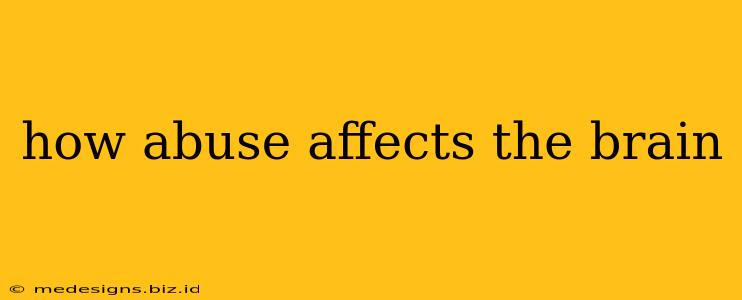Abuse, in all its forms – physical, emotional, and sexual – has devastating consequences that extend far beyond immediate physical injuries. The impact of abuse profoundly alters brain structure and function, leading to a range of long-term mental and physical health problems. Understanding these neurological effects is crucial for developing effective prevention and intervention strategies.
The Brain Under Siege: How Abuse Changes Neural Pathways
The brain, particularly during childhood and adolescence when it's still developing, is exceptionally vulnerable to the toxic effects of abuse. Trauma experienced during these crucial developmental periods can disrupt the formation and maturation of neural pathways, altering brain architecture in significant ways.
1. The Amygdala: The Fear Center
The amygdala, the brain region responsible for processing emotions, particularly fear and anxiety, is significantly impacted by abuse. Chronic exposure to trauma can lead to an overactive amygdala, resulting in:
- Heightened anxiety and fear responses: Survivors may experience excessive fear, panic attacks, and hypervigilance.
- Difficulty regulating emotions: Managing emotions becomes challenging, leading to outbursts of anger, sadness, or other intense feelings.
- Increased risk of PTSD: Post-traumatic stress disorder (PTSD) is a common consequence of trauma, characterized by flashbacks, nightmares, and avoidance behaviors.
2. The Hippocampus: Memory and Learning
The hippocampus, vital for learning, memory consolidation, and spatial navigation, is also severely affected by abuse. Trauma can lead to:
- Impaired memory function: Difficulty recalling events, details, or even entire periods of time.
- Problems with learning and concentration: Challenges in school, work, or other areas requiring focus and concentration.
- Disrupted stress response: The hippocampus plays a role in regulating the body's stress response; damage can lead to difficulties coping with stress.
3. The Prefrontal Cortex: Executive Function
The prefrontal cortex, responsible for executive functions like planning, decision-making, impulse control, and working memory, is also vulnerable to the damaging effects of abuse. This can manifest as:
- Difficulty with planning and organization: Challenges with daily tasks, work projects, or other activities requiring planning and organization.
- Impulsivity and poor decision-making: Increased risk of engaging in risky behaviors or making poor choices.
- Problems with emotional regulation: Further difficulties in managing and expressing emotions.
Long-Term Effects on Mental and Physical Health
The neurological changes caused by abuse can lead to a wide range of long-term mental and physical health problems, including:
- Depression and anxiety disorders: These are extremely common among abuse survivors.
- Post-traumatic stress disorder (PTSD): A debilitating condition characterized by flashbacks, nightmares, and avoidance behaviors.
- Substance abuse: Substance use often serves as a coping mechanism for the emotional pain caused by abuse.
- Eating disorders: Body image issues and disordered eating patterns are frequently observed.
- Chronic pain and physical health problems: Stress hormones released during and after trauma can have a negative impact on the immune system and contribute to various health issues.
- Relationship difficulties: Trauma can significantly impact relationships, leading to difficulties in forming and maintaining healthy connections.
Seeking Help and Recovery
It's crucial to remember that healing is possible. Seeking professional help is a vital step in the recovery process. Therapies like trauma-informed therapy, cognitive behavioral therapy (CBT), and EMDR can be effective in addressing the neurological and psychological effects of abuse. Support groups and peer support can also provide invaluable comfort and understanding.
Keywords: abuse, trauma, brain, neurological impact, amygdala, hippocampus, prefrontal cortex, PTSD, mental health, physical health, recovery, therapy, healing, childhood trauma, emotional abuse, physical abuse, sexual abuse
Note: This information is for educational purposes and should not be considered medical advice. If you or someone you know has experienced abuse, please seek professional help.
